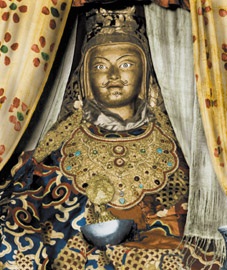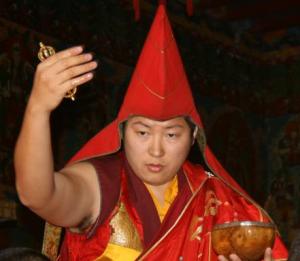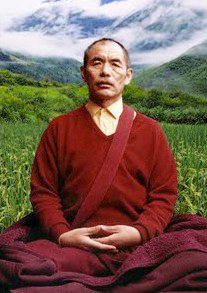Kindness – Phakchok Rinpoche message in March 2012 สารจากท่าน พักชก ริมโปเช มีนาคม 2555
Practicing Kindness
|
 Dear Friends Near and Far, Dear Friends Near and Far,
I hope you’ve all been healthy and happy. It’s been two months since our last connection, and for those of you who noticed that I didn’t drop into your mailbox last month, I truly apologize. I’ve been away the past month on a family pilgrimage where I din’t have access to internet. Anyhow, a very happy Guru Rinpoche Day to you all today. This month’s Guru Rinpoche Day is a special one as it falls on a Saturday, and therefore a “pen chu”.Today I want to relay to you all the importance of practicing kindness. Actually what is kindness? Kindness is the basis of happiness. Kindness is the basis of the life we live. Kindness is the basis of the dharma. The basis of practicing the dharma should be on a caring positive mind. So kindness is understanding. Kindness is a thing that you don’t take advantage of. It is seeing that it is directly and indirectly benefiting you. For example, if you are giving alms to a beggar and if you have a feeling of savior or superiority, then think twice. Who is doing a favor to whom. I would say that the beggar is doing a favor to you. If there is no beggar, and if you have the motivation of accumulating merit by giving alms to beggars, then who are you going to give to? Kindness can produce a good caring heart. So think of kindness towards your parents who care for you, your friends who are doing something special to you, and even to a waiter who is serving you. Don’t take advantage of that or think you own that because it is their responsibility or that they should since you are paying for it. Kindness can help you gain caring and showing kindness means you understand. So please practice kindness. When you think of kindness towards your teacher, you gain devotion. When you think of kindness towards your parents, you gain respect and caring. And when you practice kindness towards the general public, you become more positive and good hearted, naturally. When you practice kindness towards your loved ones, your understanding grows and so does your patience. So basically only by practicing kindness, you are producing more positive thoughts and as a result, improving the qualities of your life. For those of you who don’t feel much kindness towards others, you should at least be very kind to your ego! The most important key is that you need to see your own faults and to do this, you need to be kind to your ego. Because when you do so, you’ll see your mistakes and the causes of those mistakes. I know that everyone has so many things to do mundanely and in their practice as well and I wouldn’t want to add anymore to that. But please do think of my message today. I’m participating in a ceremonial puja of longevity which goes on for nine days on a 24 hour period. I’m sitting through the day session from sunrise to sunset and today I’m a feeling a little down with a cold and at the moment a little tired and dizzy while writing this to you. So think of kindness towards me for starters! Kindness is a very positive thought which leads to a positive life and that in turn makes your life more meaningful leaving no room for regrets and therefore free of suffering. How kind of “kindness” in creating a ripple of kind positive effects in our lives. Last but not the least, when you are having your next meal, try to practice kindness towards the person preparing the meal, or to the one serving you that meal, to those who planted that meal and to those insects who died in the process and when you think of kindness in this manner, your meal naturally becomes precious, more delicious, more unique and as a result, makes you more positive, more compassionate and basically more meaningful all because of just thinking of kindness! Thinking of kindness, I seal today’s GRD message with much love and affection towards all of you, wherever you are. Sarva Mangalam, Phakchok Rinpoche
|





